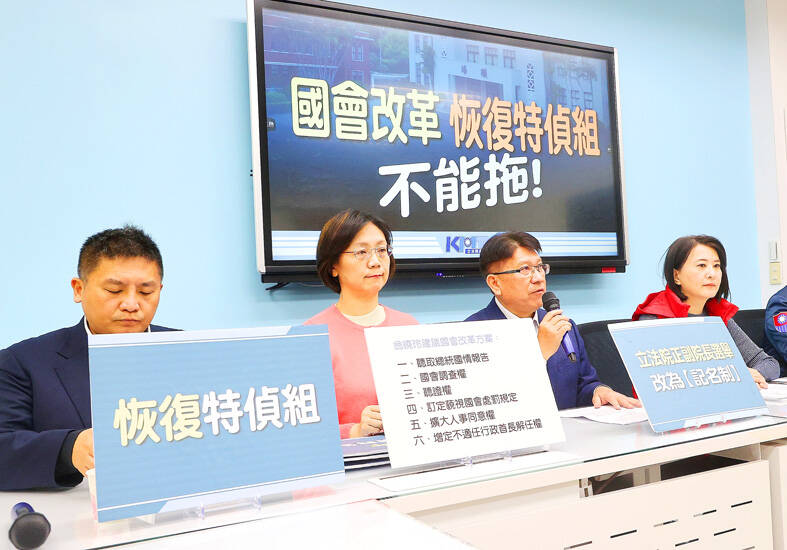Contempt of legislature and giving false testimony during a legislative inquiry should be punishable offenses, the Chinese Nationalist Party (KMT) said on Monday.
Following a party meeting, KMT caucus whip Fu Kun-chi (傅?萁) said that the public wants reform to allow greater legislative oversight of the government.
The party’s proposed measures would make the legislative speaker and deputy speaker election an open ballot, normalize presidential reports to the legislature, give the legislature more of a say on personnel appointments at critical government agencies and bolster the legislature’s powers of inquiry.

Photo: CNA
The KMT said that the Criminal Code and the Act Governing the Legislative Yuan’s Power (立法院職權行使法) should be amended to mandate that answers provided by those being questioned in the legislature be focused and to the point.
Those being questioned must provide a response or information as long as it would not harm national security or confidentiality, it said.
False statements and other actions would be deemed to be contempt of the Legislative Yuan, the proposed amendments say.
The speaker or a legislator asking the questions would have the option to request that punishment be applied in cases of contempt, with the votes or signatures of at least one-fifth of the attending lawmakers required to approve action, the proposed changes say.
The fines would be NT$20,000 to NT$100,000 and failure to retract or correct falsehoods could accrue subsequent fines, they say.
Extreme cases could be referred to the courts, with those found guilty facing up to three years in prison and a maximum fine of NT$300,000, they say.
The president should present a “state of the nation” report to the legislature on Feb. 1 every year and attend a Legislative Yuan session on March 1, the KMT said.
New presidents should deliver a report within two weeks of their inauguration and appear before the Legislative Yuan within a month, it said.
Legislators would be able to ask the president questions about the report and the president should respond immediately, the proposed amendments say.
Democratic Progressive Party Legislator Rosalia Wu (吳思瑤) told reporters that legislative reforms should give power in accordance to the body’s responsibilities.
Reforms should not expand legislative power, as the public would not stand for it, Wu said.
The KMT’s proposals are an attempted power grab, she said, adding that based on the party’s performance in the legislature, it is hard to tell whether government officials should hold legislators in contempt or vice versa.

Taiwan has received more than US$70 million in royalties as of the end of last year from developing the F-16V jet as countries worldwide purchase or upgrade to this popular model, government and military officials said on Saturday. Taiwan funded the development of the F-16V jet and ended up the sole investor as other countries withdrew from the program. Now the F-16V is increasingly popular and countries must pay Taiwan a percentage in royalties when they purchase new F-16V aircraft or upgrade older F-16 models. The next five years are expected to be the peak for these royalties, with Taiwan potentially earning

POSITIVE DEVELOPMENT: Japan and the US are expected to hold in-depth discussions on Taiwan-related issues during the meeting next month, Japanese sources said The holding of a Japan-US leaders’ meeting ahead of US President Donald Trump’s visit to China is positive news for Taiwan, former Japan-Taiwan Exchange Association representative Hiroyasu Izumi said yesterday. After the Liberal Democratic Party’s landslide victory in Japan’s House of Representatives election, Japanese Prime Minister Sanae Takaichi is scheduled to visit the US next month, where she is to meet with Trump ahead of the US president’s planned visit to China from March 31 to April 2 for a meeting with Chinese President Xi Jinping (習近平). Japan and the US are expected to hold in-depth discussions on Taiwan-related issues during the

‘LIKE-MINDED PARTNER’: Tako van Popta said it would be inappropriate to delay signing the deal with Taiwan because of China, adding he would promote the issue Canadian senators have stressed Taiwan’s importance for international trade and expressed enthusiasm for ensuring the Taiwan-Canada trade cooperation framework agreement is implemented this year. Representative to Canada Harry Tseng (曾厚仁) in an interview with the Central News Agency (CNA) said he was increasingly uneasy about Ottawa’s delays in signing the agreement, especially as Ottawa has warmed toward Beijing. There are “no negotiations left. Not only [is it] initialed, we have three versions of the text ready: English, French and Mandarin,” Tseng said. “That tells you how close we are to the final signature.” Tseng said that he hoped Canadian Prime Minister Mark Carney

STAY IN YOUR LANE: As the US and Israel attack Iran, the ministry has warned China not to overstep by including Taiwanese citizens in its evacuation orders The Ministry of Foreign Affairs (MOFA) yesterday rebuked a statement by China’s embassy in Israel that it would evacuate Taiwanese holders of Chinese travel documents from Israel amid the latter’s escalating conflict with Iran. Tensions have risen across the Middle East in the wake of US and Israeli airstrikes on Iran beginning Saturday. China subsequently issued an evacuation notice for its citizens. In a news release, the Chinese embassy in Israel said holders of “Taiwan compatriot permits (台胞證)” issued to Taiwanese nationals by Chinese authorities for travel to China — could register for evacuation to Egypt. In Taipei, the ministry yesterday said Taiwan